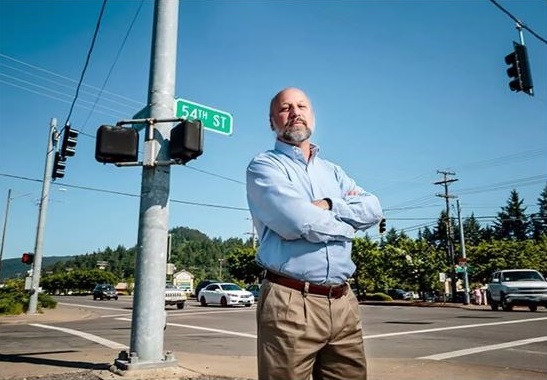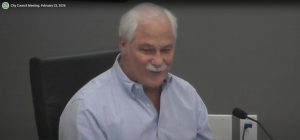Rob Zako: Pedestrian safety requires political will
4 min read
On Feb. 22, 2015, a family went for ice cream on Springfield’s Main Street. From Better Eugene Springfield Transportation, Rob Zako.
[00:00:10] Rob Zako: I am Rob Zako, executive director of BEST, the 501(c)(3) nonprofit that formed 10 years ago. We work on transportation options, safe streets and walkable neighborhoods,
[00:00:20] A report from Smart Growth America just came out earlier this week. Every year they report on the safety of our streets nationwide. They have a report called Dangerous by Design, and the number of pedestrians that have been killed in traffic crashes over the last couple years has gone up, even though driving has gone down during the pandemic. We really have a crisis with pedestrian deaths and serious injuries.
[00:00:44] But what I’d like to do is focus on something that I know really well, and it’s a good case study.
[00:00:49] I want to focus on what happened on February 22nd, 2015. Here’s a family, mom, three kids, and on that day, I believe they were getting ice cream. This was Main Street in Springfield at 54th and they were in the crosswalk, they had the green light. And a pickup truck driver’s driving rather fast, didn’t see them and hit the whole family.
[00:01:13] The mother survived. All three kids perished: John Alexander Day, age eight, McKenzie Mae Hudson, age five, and Tyler James Hudson, age four. Not a particularly age-friendly street if you can’t get an ice cream cone and cross the street with a traffic light, and this happens.
[00:01:32] This really shook the community of Springfield. It shook my organization. It was this tragedy that caused my organization to focus on Vision Zero and safety.
[00:01:41] John Q: Rob spoke at the Livable Communities webinar sponsored by the AARP.
[00:01:45] Rob Zako: You might think that this is a story that has a good ending. That was seven years ago that tragedy. It galvanized the community to do something. But just last month, the Springfield City Council adopted a resolution basically saying they didn’t like the plans they developed over the last several years. The plan that they have is not moving forward and they’re back to square one.
[00:02:03] That was not really the outcome that we were expecting or we were hoping for. There was a tragedy. There was a desire to act. There’s a desire to make Main Street safer. We know what the problems are. We know what the solutions are. And yet seven years later, nothing significant has happened in Springfield.
[00:02:20] I don’t want to single out Springfield though. Again, Springfield is just a community that we know well, but it could really be anywhere in America.
[00:02:28] John Q: Rob later took questions from the AARP’s Elaine Friesen-Strang.
[00:02:32] Elaine Friesen-Strang: Rob, I’m going to pose a question to you. When more of us are deciding not to drive because of perhaps health or financial or climate-saving reasons, what can the state, local jurisdictions be doing to make transit more available, accessible, and safe?
[00:02:52] Rob Zako: I’ll interpret that, Elaine, as a two-part question. I think the question is what the public sector, what governments can do. And the other half of the question is what can we as citizens, as activists, do to make that happen.
[00:03:03] The solutions are fairly clear, you know: Put more money into transit to have more frequent, more reliable, more convenient bus service; build our streets for all users of the streets, for people walking and biking, rolling, riding the bus, not just for people driving.
[00:03:20] The issues are not technical here. They’re not—they’re not questions of what to do. They’re questions of political will.
[00:03:27] And Bloomberg City Lab says, we see this over and over and over again, we have communities that have plans to do the right thing. And then what happens is that people who drive or people who are businesses say, ‘Oh, we don’t want to change anything.’ And we get the status quo. We get no changes.
[00:03:42] What’s needed is for organizations like AARP and BEST and others, for our members to work together, to demand that our elected representatives in fact represent us. And represent all of us, not just some of us. That’s easier said than done, but it comes down to that.
[00:04:00] Elaine Friesen-Strang: So a follow up to that, one of our questions was: Are there organizations outside of the Portland area that are doing what BEST is doing, particularly in rural areas?
[00:04:13] Rob Zako: Yes, not exactly what we’re doing. Each organization’s different. There is a statewide network called the Clean and Just Transportation Network, CJTN. And it’s a loose coalition of 40 or so organizations, equity organizations, environmental, climate change organizations.
[00:04:32] It is as you’d expect in Oregon, heavily focused around Portland because that’s where a lot of people are and a lot of organizations. But we’re working with organizations down in the Rogue Valley, down in Medford, in Bend, in Roseburg, in Corvallis, and elsewhere around the state.
[00:04:46] The problems are not unique to any one community. I think I mentioned we don’t want to reinvent the wheel. We want to take what’s worked elsewhere and apply it to the communities that we have. A lot of this is educating our elected officials, educating our populace about what the problems are and what the solutions are, and that just takes rolling up our sleeves and doing work.
[00:05:04] BEST is increasingly looking to partner with organizations around the state. I have a fair amount of personal expertise that I’m happy to share with others. But we can’t do the work in other communities. People who live there have to support their own communities.
[00:05:17] John Q: Rob Zako of Better Eugene Springfield Transportation, speaking at the AARP’s Livable Communities webinar July 14.




